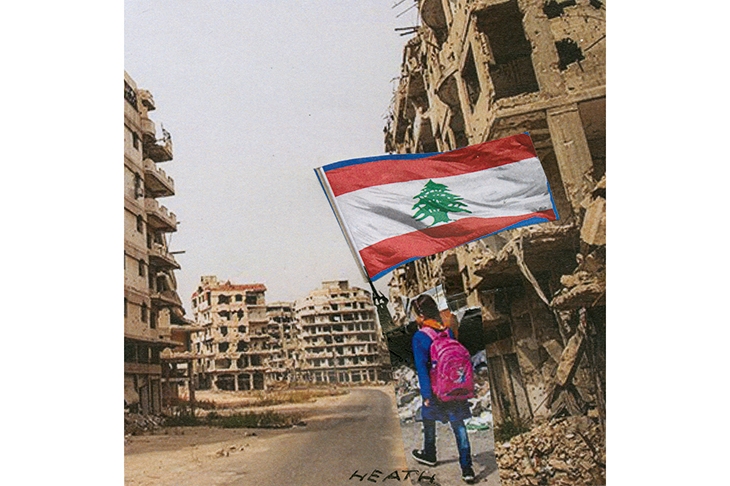Look down from the mountains outside Beirut and, on most days, you’ll see a grey blanket of smog choking the city. The smog comes from diesel generators: almost every building in Lebanon is hooked up to one because of rolling power cuts. This isn’t because Israel bombed one of the country’s few power stations in 2006, though it did. Instead, the power cuts are a constant reminder to the Lebanese of their politicians’ greed, venality and incompetence. Successive governments have failed to build new power stations. Some are supposed to be finished next year, finally, but everyone knows they won’t be enough. The Lebanese will tell you that the ‘generator mafias’ are in business with the politicians and there’s so much money being made that things will never change. People shrug and accept this. Lebanon has been unable to generate enough electricity to meet its needs since the civil war ended in 1990.
The problem is that the war never really ended. The warlords in charge back then are still around. They race through Beirut in convoys of black SUVs with tinted windows, forcing traffic aside in a cacophony of sirens, prompting waves of resentful looks. The war’s divisions were frozen in place by a deal to carve up power between the country’s different confessions: the president has to be a Christian; the prime minister, a Sunni; the speaker of parliament, a Shia. Ministers get jobs in the same way and this means they are almost impossible to sack, even in cases of the most blatant corruption. A friend from one of Lebanon’s richest families told me about a minister who was demanding thousands of dollars to sign each one of the stream of permits required to do business here. My friend’s company was the local partner of a multinational and so he wasn’t allowed to pay the bribes. ‘We had to get Saad Hariri [the prime minister] to sign a whole batch of permits himself.’ My friend’s family really had this much clout, but they couldn’t ask the prime minister to intervene every time. Soon, they were back at the minister’s desk and he, unembarrassed, had his hand out again.
My friend had wasta, or connections. We had a lesson in the importance of this when we moved house last month and needed the internet set up. The offices of the Lebanese state telephone company Ogero conjure up what I imagine the old British GPO must have been like. After four unsuccessful trips to Ogero, we realise we know someone who knows someone who works at the company’s headquarters. Bingo! Two engineers arrive. The youngest, and most competent, explains that, yes, Ogero’s map shows that our neighbourhood, Gemmayzeh, is covered by the new fibre optic network, but, no, it hasn’t actually been switched on here yet. It’s being held back, he says, so some local politicians can promise brilliant new internet just before the next election. He’s sick of all this and is emigrating to Canada. The older one says that in theory we could have internet over the phone line, but he’s only allowed to install one metre of cable and the junction box is 100 metres away. Couldn’t you just run the cable over there, we ask, pointing at the box. He replies: ‘Do you know the prime minister of Lebanon?’ He isn’t joking.
One of the prime minister’s aides happens to be at a smart dinner party I’m invited to. Just for a moment, I consider asking if they’ll help with our phone line. The talk is of how the economy is at breaking point and with it, perhaps, the fragile system of power-sharing that has existed since the civil war. The Lebanese street is angry. Protests are starting up again over the state’s inability to complete even simple tasks like disposing of rubbish properly. (The protesters’ slogan: ‘You stink!’) Everyone around the table agrees that the Lebanese always find a way to get by with or without the state. And despite a few inconveniences, Lebanon remains a wonderful place to live: the beaches, the mountains, the restaurants, the nightlife. A former MP at the dinner says: ‘We may be a failed state, but we are the world’s best failed state.’
However bad things get, most Lebanese I speak to believe that at least they won’t get dragged into another war with Israel. Hezbollah, the Shia militia in Lebanon, is said to have up to 150,000 missiles pointing at Israel but it will never use them, the argument goes, because its leaders know how devastating the response would be. So if Iran is attacked by the US — and Israel and Saudi Arabia — Hezbollah would stay out of it. This is a comforting illusion. Hezbollah probably doesn’t want to have a bloody confrontation with Israel, but the leadership might have no choice. They answer to Tehran, and the priority for the regime there is regime survival.
Whether Britain would join in with an attack on Iran will depend on our new prime minister. I’ve met BoJo only once, standing next to a mass grave in Kosovo as it happens. Boris said ‘This is a rum business, isn’t it’ or words to that effect, while around us some 80 ethnic Albanian victims of Serb paramilitaries were disinterred. Johnson had been covering Nato’s bombing of Yugoslavia from Belgrade for the Daily Telegraph. People sometimes forget that he is the first British prime minister since James Callaghan to have seen a war at close quarters. True, Callaghan was an officer in the Royal Navy and Johnson was a mere hack. But still, he will know the effects on the human body of high explosive dropped from 30,000 feet. I wonder if this will inform his decisions on Iran.






Comments